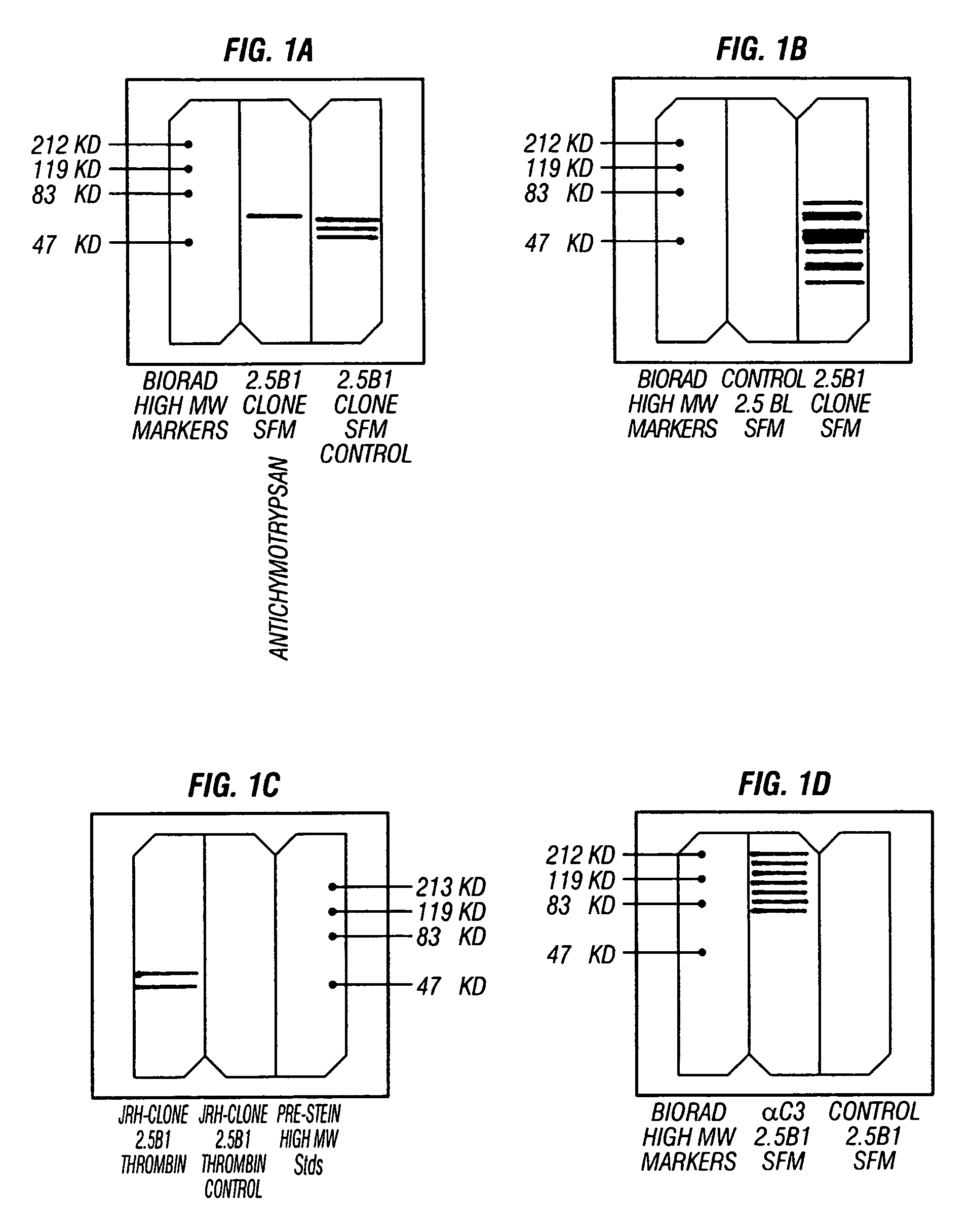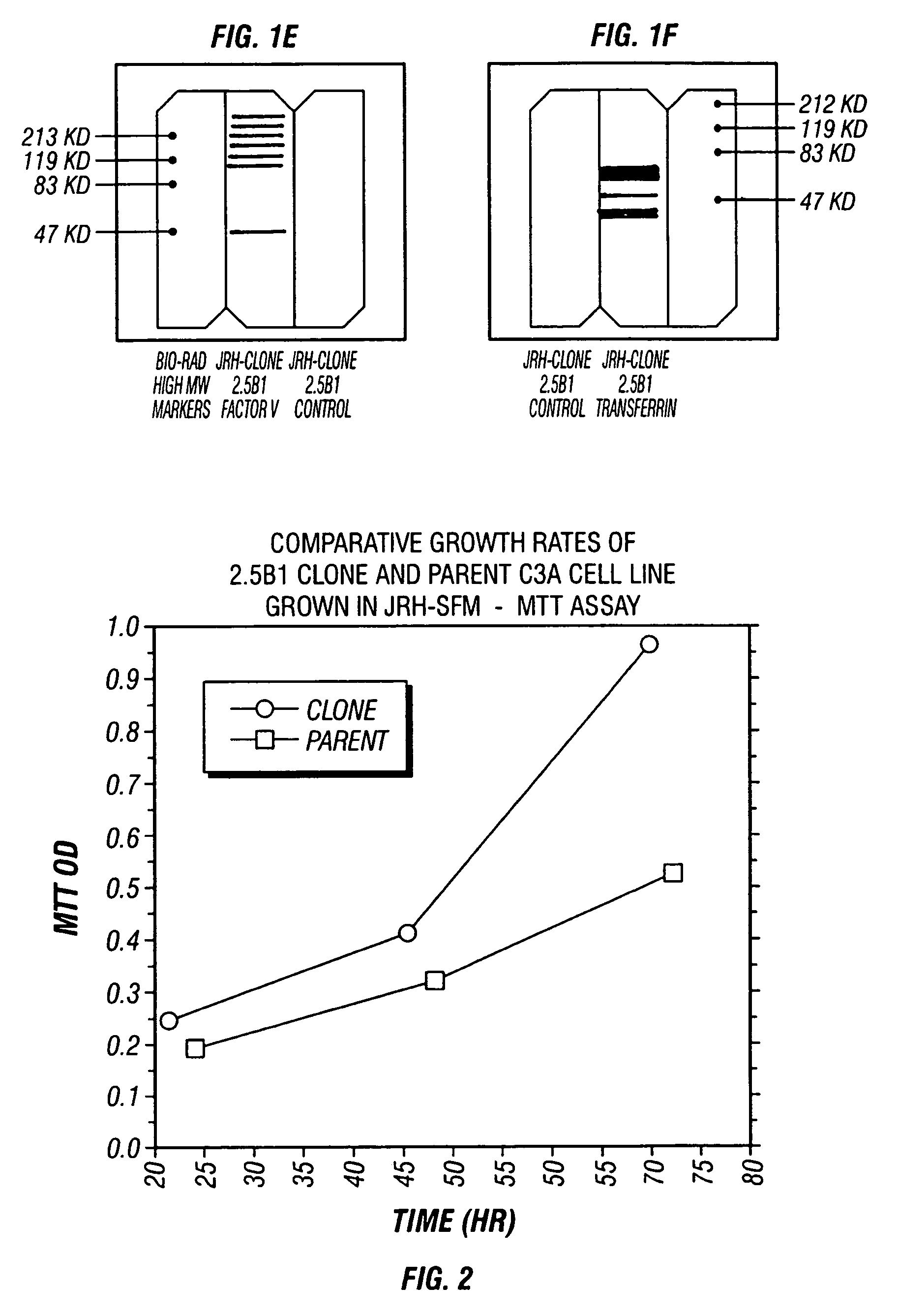C3A serum-free clonal cell line and methods of use
a clonal cell line and serum-free technology, applied in the field of serum-free c3a cell lines, can solve the problems of increasing the price of serum supplementation, complicating the production process, and many limitations of serum supplementation, so as to reduce the risk of producing contaminated bio-products, shorten the doubling time, and increase the growth rate
- Summary
- Abstract
- Description
- Claims
- Application Information
AI Technical Summary
Benefits of technology
Problems solved by technology
Method used
Image
Examples
example 1
Generation of a Serum-Free C3A Clone
[0065]Seven commercial serum-free formulations, and one custom serum-free formulation (Hepatix Inc.), were tested for the ability to support the consistent growth of C3A cells during passaging to serum independent status:[0066](1) JRH Biosciences' ExCell 620 medium (product #14620-79P) supplemented with 2 mM L-glutamine;[0067](2) Gibco's Hepatozyme-SFM (catalog #17705-021) supplemented with L-glutamine;[0068](3) Gibco's Aim V Medium (catalog #12055-091);[0069](4) HyClone's HyQ-CCM4 medium (catalog #SH30106.02);[0070](5) Irvine Scientific's IS293 medium (catalog #99269);[0071](6) Clonetics' Hepatocyte Maintenance Medium (catalog # CC-3197) supplemented with insulin and dexamethasone;[0072](7) BioWhittaker prototype Hepatocyte Medium (ref ˜97-0454) supplemented with glucagon, insulin, dexamethasone, sodium selenite, triiodothyronine (T3) and linoleic acid / bovine serum albumin (Hepatix supplements); and[0073](8) a Hepatix serum-free medium formulatio...
example 2
Comparative Growth Rates of C3A Clone in Different Serum-Free Media
[0077]After four passages in 100% serum-free medium, a comparative growth rate analysis was performed on cells from each of the eight cultures. Growth rate was assessed using the Promega MTS assay system in medium Nos. 1, 3 and 5 (respectively, JRH Biosciences' ExCell 620 supplemented with 2 mM L-glutamine; Gibco's Aim V; and Irvine Scientific's IS293). The most consistent growth was determined to be for cells maintained in medium No. 1 (JRH Biosciences' ExCell 620). Consequently, this medium was subsequently employed to produce clonal isolates of serum-free cells.
example 3
Generation of C3A Clonal Cell Colonies
[0078]Clones were generated by limiting dilution (2.5 cells per well in JRH Biosciences' ExCell 620 serum-free medium (JRH-SFM)) in a 96-well plate. Using this strategy, twelve separate clones were initiated, harvested, expanded and subsequently cryo-preserved. Of the twelve clonal isolates, one clone (designated 2.5B1) was chosen for further development.
[0079]The 2.5B1 clone at passage zero (P0) was harvested 21 days after plating. It was re-plated (96-well tissue culture plate) for 4 days (P1), trypsinized and seeded into a T25 flask (P2) for expansion in JRH-SFM (No. 1). Twelve days later it was harvested, re-plated into another T25 flask (P3) for 2 days, subsequently split (1:3) into a T75 flask (P4), then split (1:8) approximately every seven days with thrice weekly feedings of JRH-SFM. The 2.5B1 clonal culture was successfully passaged 14 times with over 30 population doublings since P2.
PUM
| Property | Measurement | Unit |
|---|---|---|
| pore size | aaaaa | aaaaa |
| molecular weight | aaaaa | aaaaa |
| molecular weight | aaaaa | aaaaa |
Abstract
Description
Claims
Application Information
 Login to View More
Login to View More - R&D
- Intellectual Property
- Life Sciences
- Materials
- Tech Scout
- Unparalleled Data Quality
- Higher Quality Content
- 60% Fewer Hallucinations
Browse by: Latest US Patents, China's latest patents, Technical Efficacy Thesaurus, Application Domain, Technology Topic, Popular Technical Reports.
© 2025 PatSnap. All rights reserved.Legal|Privacy policy|Modern Slavery Act Transparency Statement|Sitemap|About US| Contact US: help@patsnap.com


